高中情态动词用法PPT课件
合集下载
情态动词讲解精ppt课件

例句
will/would
详细描述:will 表示现在的意愿或 预测,would 表示过去的或虚拟 的意愿或预测。
1. I will help you with your project.(我会帮助你完成你的项 目。)
总结词:表示意愿或预测
例句
2. They would have gone to the party if they had known about it earlier.(如果他们早点 知道,他们就会去参加聚会。)
表示意愿
情态动词+动词原形,如 would like to go,表示 某人想要去。
形式变化
基本形式
情态动词的基本形式包括 现在时、过去时和将来时 。
过去式
情态动词的过去式通常是 在基本形式后面加-d或ed,如could have done 、should have done等。
将来时
情态动词的将来时通常是 在基本形式后面加-will或shall,如will be able to 、shall have to等。
may与might的区别与联系
总结词
may表示现在的许可或可能性;might表示过去的可能性或许可。
详细描述
may用于肯定句中,表示许可或可能性,例如“You may use this room.”(你可以使用这个房间。 )“The book may be in the library.”(这本书可能在图书馆里。)might表示过去的可能性,常 用于过去时态的句子中,例如“He might come tomorrow.”(他明天可能来。)
未必、很难说
She might not agree with us.
表示虚拟语气
will/would
详细描述:will 表示现在的意愿或 预测,would 表示过去的或虚拟 的意愿或预测。
1. I will help you with your project.(我会帮助你完成你的项 目。)
总结词:表示意愿或预测
例句
2. They would have gone to the party if they had known about it earlier.(如果他们早点 知道,他们就会去参加聚会。)
表示意愿
情态动词+动词原形,如 would like to go,表示 某人想要去。
形式变化
基本形式
情态动词的基本形式包括 现在时、过去时和将来时 。
过去式
情态动词的过去式通常是 在基本形式后面加-d或ed,如could have done 、should have done等。
将来时
情态动词的将来时通常是 在基本形式后面加-will或shall,如will be able to 、shall have to等。
may与might的区别与联系
总结词
may表示现在的许可或可能性;might表示过去的可能性或许可。
详细描述
may用于肯定句中,表示许可或可能性,例如“You may use this room.”(你可以使用这个房间。 )“The book may be in the library.”(这本书可能在图书馆里。)might表示过去的可能性,常 用于过去时态的句子中,例如“He might come tomorrow.”(他明天可能来。)
未必、很难说
She might not agree with us.
表示虚拟语气
高中英语情态动词精品PPT课件

— Might I watch TV after supper? — Yes, you ________. A. may B. must C. might D. could
.
11
3.表推测,表示主观上的推测,“可能,
也许”,不用于疑问句, might比
may的可能性更小
She may not like this place.
—Yes, he _______. A. need B. must C. may D. will
.
15
2. must表示肯定的推测。 The light is still on, so he must be at home.
Look at his new car. He ______ have a lot of money. A. should B. shall C. may D. must
I can’t believe my eyes. Such well-educated
gentleman ____ behave like this!
A.will B. would C. should D. must
What time ought I _______?
A.arrived
B.arriving
C.arrive
D.to arrive
He _______ speak to his mother like that. A.ought not to B.doesn’t ought to C.not ought to D.ought to not
.
22
1. should= ought to 表示劝告,建议,意 为“应该”, ought to 语气更强些,强调“有责任,有 义务做”
高中英语情态动词 课件(共22张PPT)

A. could have led B. would lead C. should have led D. must lead
【答案】A
情态动词
考点链接
请用合适的情态动词及括号内所给动词的适 当形式填空。
(1)—Tom graduated from college at a very young age.
2. He might have given you more help, but he was busy then.
情态动词
3. He abandoned a career that ______ to his becoming one of the most influential people in the world.
【答案】C
情态动词
1. Since this road is wet and slippery this morning, it _____ last night.
A. Must rain B. was raining C. Must have rained D. may rain 【答案】C
2. I believe he _____ an accident, otherwise he would have arrived on time.
(3)—Need I go with you to the office? (肯定回答)
—____________. 【答案】 Yes,you must
情态动词
(4)—Might I have talk with you this evening?(肯定回答) —____________. 【答案】 Yes,you can/may
A. to report B. to have reported C. to reporting D. have reported 【答案】B
【答案】A
情态动词
考点链接
请用合适的情态动词及括号内所给动词的适 当形式填空。
(1)—Tom graduated from college at a very young age.
2. He might have given you more help, but he was busy then.
情态动词
3. He abandoned a career that ______ to his becoming one of the most influential people in the world.
【答案】C
情态动词
1. Since this road is wet and slippery this morning, it _____ last night.
A. Must rain B. was raining C. Must have rained D. may rain 【答案】C
2. I believe he _____ an accident, otherwise he would have arrived on time.
(3)—Need I go with you to the office? (肯定回答)
—____________. 【答案】 Yes,you must
情态动词
(4)—Might I have talk with you this evening?(肯定回答) —____________. 【答案】 Yes,you can/may
A. to report B. to have reported C. to reporting D. have reported 【答案】B
高中英语情态动词各种用法课件(共47张PPT)

一 、表能力 :表现在的或一般的能力:表示 现在的或一般的能力用can 或 be able to. 一 般的能力是指你无论什么时候做什么事情就 能做到的能力。表示现在的能力或一般的能 力时,can比be able to 更普遍。
A computer can’t think for itself; it must be told what to do. (表示一般的能力)
This can’t / couldn’t be done by him. (表示不 相信)
He could be on his way home now. (could 不 如 may / might常用)
Can this be done by him? (表示一种疑惑、 惊讶)
(3)would, could, should, might 并不一定 与过去的时间有关,而是表示可能性弱于他 们相应的现在形式。如:
do something / succeeded in doing sth.
The fire spread through the hotel very
quickly but everyone was able to get out. (过去有能力并成功地做了某事)
(3) could have + 过去分词,表示过去有 能力做但未做。
表示对过去已经发生的行为进行推测,意为 “想必 / 准是/ 一定做了某事
It must have rained last night, for the road was quite muddy.
The lights were out. They must have been asleep.
2. can have done
情态动词的用法PPT课件
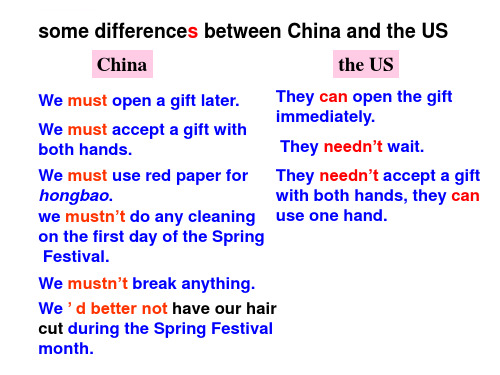
“雪亮工程"是以区(县)、乡(镇) 、村( 社区) 三级综 治中心 为指挥 平台、 以综治 信息化 为支撑 、以网 格化管 理为基 础、以 公共安 全视频 监控联 网应用 为重点 的“群 众性治 安防控 工程” 。
Exercises:
My brother was very ill, so I ( had to) call the doctor in the middle of the night.
“雪亮工程"是以区(县)、乡(镇) 、村( 社区) 三级综 治中心 为指挥 平台、 以综治 信息化 为支撑 、以网 格化管 理为基 础、以 公共安 全视频 监控联 网应用 为重点 的“群 众性治 安防控 工程” 。
some differences between China and the US
China
3 Underline the correct words.
注意: might为may的过去式,但也可以代替may, 语气较为婉转客气或更加不肯定。
“雪亮工程"是以区(县)、乡(镇) 、村( 社区) 三级综 治中心 为指挥 平台、 以综治 信息化 为支撑 、以网 格化管 理为基 础、以 公共安 全视频 监控联 网应用 为重点 的“群 众性治 安防控 工程” 。
— For your health, I’m afraid you ______. (2011贵州安顺)
A. may B. can C. have to D. need
“雪亮工程"是以区(县)、乡(镇) 、村( 社区) 三级综 治中心 为指挥 平台、 以综治 信息化 为支撑 、以网 格化管 理为基 础、以 公共安 全视频 监控联 网应用 为重点 的“群 众性治 安防控 工程” 。
高中英语情态动词PPT课件
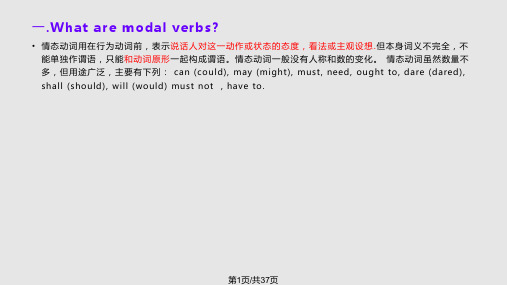
第11页/共37页
very uncertain
almost certain
might may could (can) should ought to will must
1.He _____ be at home.
A.may B.might C.must
2.He _____ be at home, for he just called me from his home 15 seconds ago.
Would rather…
第20页/共37页
will/would:
2.表示意志、愿望和决心。 有愿意,要的意思,will指 现在,would指过去的习惯 性动作或倾向。
I will never do that again.
I would go there with you.
第21页/共37页
will/would:
can表示与生俱来的能力或一种客观可能,而 be able to更加强调通过后天的学习和努力获 得的能力,或者在某个客观的场合和背景下, 能做到的事情。
第8页/共37页
advisability
necessity
ought to/should
have to
must
Your mother brings you up and takes good care of you, so when she is old, you ___ look after her in return.
第15页/共37页
4.Permission(允许) may/might:
1. 表示许可,常译为可以。表示请 求、允许时,might比may的语气 -更Mi委gh婉t/一M些ay。I use your computer? - Yes, you can. /No, you can’t/mustn’t.
very uncertain
almost certain
might may could (can) should ought to will must
1.He _____ be at home.
A.may B.might C.must
2.He _____ be at home, for he just called me from his home 15 seconds ago.
Would rather…
第20页/共37页
will/would:
2.表示意志、愿望和决心。 有愿意,要的意思,will指 现在,would指过去的习惯 性动作或倾向。
I will never do that again.
I would go there with you.
第21页/共37页
will/would:
can表示与生俱来的能力或一种客观可能,而 be able to更加强调通过后天的学习和努力获 得的能力,或者在某个客观的场合和背景下, 能做到的事情。
第8页/共37页
advisability
necessity
ought to/should
have to
must
Your mother brings you up and takes good care of you, so when she is old, you ___ look after her in return.
第15页/共37页
4.Permission(允许) may/might:
1. 表示许可,常译为可以。表示请 求、允许时,might比may的语气 -更Mi委gh婉t/一M些ay。I use your computer? - Yes, you can. /No, you can’t/mustn’t.
高中英语高考高考英语语法总复习课件:情态动词课件 (共33张PPT)

done
would r ather
(而做了) 本不必做
(而做了)
宁愿当时没做
her the secr et. You needn ’t have taken a taxi, for it was near to my
house. I would r ather not have
not have done (后悔当时做了) scolded my son.
• 3. 表示习惯性的动作或倾向,“总是,常常”
•
例:When I was a little child, I would go swimming with
•
other children in summer.
• used to do过去常常现在不做了
• would do过去常常有可能现在还在做
• 5. need/dare • 情态动词:没有人称和数的变化,直接接动词原形, • 构成否定和疑问时不用助动词。 • 实意动词:有人称和数的变化,构成否定和疑问时借 • 助助动词do,does,did • 口诀: need,dare真诡异,既有情态又实意。 • 情态动词把to退,实意动词to跟随。 • need doing是特例,=need to be done需牢记。
need to do
• need /want/ requir doing表被动=need /want/ requir to be done
• shall • 1. 征求对方意见或建议,用于第一、第三人称。 • 例:Shall we go now? • 2. 表示允诺、警告、命令,用于第一,二、三人称。 • 例:All of us shall arrive before 5 o’clock. • 3. 表示规章、法令、制度的规定,“必须”=must law,rule做主语时 • 例:The law of Venice says that if anyone tries to kill or • murder any citizen of Venice, everything that he owns shall • be taken away from him.
would r ather
(而做了) 本不必做
(而做了)
宁愿当时没做
her the secr et. You needn ’t have taken a taxi, for it was near to my
house. I would r ather not have
not have done (后悔当时做了) scolded my son.
• 3. 表示习惯性的动作或倾向,“总是,常常”
•
例:When I was a little child, I would go swimming with
•
other children in summer.
• used to do过去常常现在不做了
• would do过去常常有可能现在还在做
• 5. need/dare • 情态动词:没有人称和数的变化,直接接动词原形, • 构成否定和疑问时不用助动词。 • 实意动词:有人称和数的变化,构成否定和疑问时借 • 助助动词do,does,did • 口诀: need,dare真诡异,既有情态又实意。 • 情态动词把to退,实意动词to跟随。 • need doing是特例,=need to be done需牢记。
need to do
• need /want/ requir doing表被动=need /want/ requir to be done
• shall • 1. 征求对方意见或建议,用于第一、第三人称。 • 例:Shall we go now? • 2. 表示允诺、警告、命令,用于第一,二、三人称。 • 例:All of us shall arrive before 5 o’clock. • 3. 表示规章、法令、制度的规定,“必须”=must law,rule做主语时 • 例:The law of Venice says that if anyone tries to kill or • murder any citizen of Venice, everything that he owns shall • be taken away from him.
高中英语语法情态动词(28张PPT)-经典通用课件资料

2021/10/10
19
4. Tom ought not to ___ me your secret,
but he meant no harm.
A. have told
B. tell
C. be telling
D. having told
答案A 由于后句为过去时,告诉秘密的动作又发生在其前因,此地应用过去完成时,但它在情态动词 ought to 后,所以用have。
Must I go there in person? 我必须亲自去吗? We must always follow the Party.我们要永远跟着党走。 ②表示“必然”
All men must die.人总是要死的。 ③表示推测,“准是”、“一定”,否定形式为can’t
She must be at home now.她现在准在家。
- May I come in? -Might I go to the hospital to see my father? ②否定形式为may not, 但表示“不可以”或“禁止”时用must not (mustn’t). e.g.-May I watch TV now?我现在可以看电视吗? -No, you mustn’t. 不,你不可以看。 ③ may, might还可以表示推测,但might可能性比may 小。 e.g. There may be a few copies left in the bookstore. 书店里可能还有几本书。 They might have been killed by radiation. ④may 放在句首, 表示祝愿。 e.g. May God bless you!
e.g. You don’t have to tell him about it. 你没必要把此事告诉他。
高中英语语法 情态动词用法总结(20张PPT)-经典通用课件资料
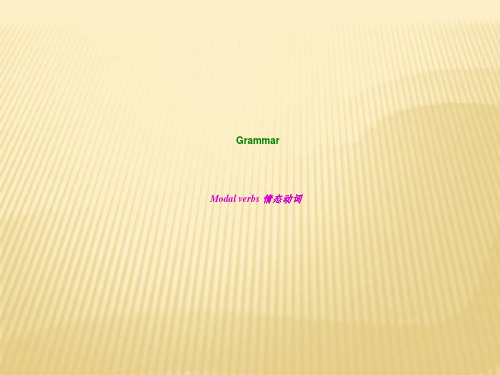
A. could B. would C. should D. might
C
2. What do you mean, there are only ten tickets? There_____
A. should CA. will
B. would D. shall
be twelve.
2021/10/10
13
5. must
1. 表示义务或强烈的劝告,意为“必须”“应该”, 其否定式表示“不应该”“不许可” “不准”“禁止”。
Eg: 1) You must finish your homework first. 2) Children mustn’t speak like that to their parents.
3. 表推测,用于肯定句,意为“一定”“务必”。
Eg: 1) Betty must be in the next room. 2) He must be watering the flowers in his garden.
2021/10/10
14
Complete the following sentences using modal verbs.
5) Can/Could I use your dictionary? 6) Could you lend me a hand?
3. 表示“请求” “允许”(表请求时,口语中常用 could 代替 can 使语气更委婉,回答时用can)
2021/10/10
4
4. 表示“许可”,可与may 换用。 You can go home now.
1. 表“请求、建议”等,用 would 比用will 委婉,客气些 Eg: 1)Will you lend me your book? 2) Would you like a cup of tea?
高一上学期英语课件:情态动词 (共20张PPT)
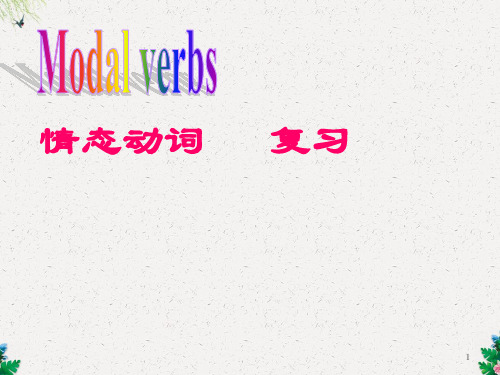
How old can he be ?. (他可能多大了?)
He may be a teacher.
(他可能是老师) He may or may not be 33. (他或许是或许不是33岁)
He must be 33. (他一定33岁) 3
1. Mary ____ be in Paris,for I saw her in
time. 他们这时该已到北京了。
8
• 解答情态动词表示猜测的试题时,一 要清楚被猜测的时间,二要清楚有无 客观事实根据。若有客观事实根据, 则无论是肯定还是否定的猜测,猜测 语气最强且符合时间要求的为最佳答 案;若无客观事实根据,纯凭主观臆 断则猜测语气最弱且符合时间要求的 为最佳答案。
• 情态动词表示猜测时语气从强到弱的 顺序是:must,should,can,may, could,might。
情态动词 复习
1
1 情态动词表示推测的用法
情态动词must,can,could,may,might都可 用来表示推测
1. must所表示的可能性最大,最有把握,意 为“一定”。 2. can和could主要用于否定句和疑问句中 ,“可 能”,can’t或couldn’t 表示“不可能”
3. may 和 might表示现在或将来可能发生的动作 或情况,意为“或许,可能”主要用于肯定句 中,might相对于may 来说,表示的可能性更小一 些。may/might not “可能不”
19
Goodbye!
20
1. They will ______ run this machine on
their own in three months.
A. can
B. could
He may be a teacher.
(他可能是老师) He may or may not be 33. (他或许是或许不是33岁)
He must be 33. (他一定33岁) 3
1. Mary ____ be in Paris,for I saw her in
time. 他们这时该已到北京了。
8
• 解答情态动词表示猜测的试题时,一 要清楚被猜测的时间,二要清楚有无 客观事实根据。若有客观事实根据, 则无论是肯定还是否定的猜测,猜测 语气最强且符合时间要求的为最佳答 案;若无客观事实根据,纯凭主观臆 断则猜测语气最弱且符合时间要求的 为最佳答案。
• 情态动词表示猜测时语气从强到弱的 顺序是:must,should,can,may, could,might。
情态动词 复习
1
1 情态动词表示推测的用法
情态动词must,can,could,may,might都可 用来表示推测
1. must所表示的可能性最大,最有把握,意 为“一定”。 2. can和could主要用于否定句和疑问句中 ,“可 能”,can’t或couldn’t 表示“不可能”
3. may 和 might表示现在或将来可能发生的动作 或情况,意为“或许,可能”主要用于肯定句 中,might相对于may 来说,表示的可能性更小一 些。may/might not “可能不”
19
Goodbye!
20
1. They will ______ run this machine on
their own in three months.
A. can
B. could
高中英语情态动词课件
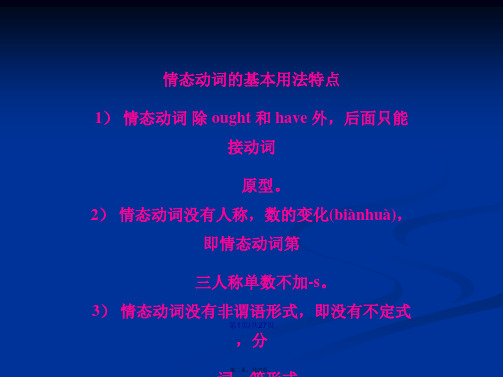
第7页/共27页
第八页,共27页。
3 must 语 have to 的 用法(yònɡ fǎ)
1 You must come to school on time . You mustn't waste any more time(必须(bìxū),禁止)
2 Must I come back before ten ?
第15页/共27页
第十六页,共27页。
You ought to have helped him with hisCEnglish, ____you ?
A. won’t you B. ought not you C. shouldn’t you D. wouldn’t you
第16页/共27页
第5页/共27页
第六页,共27页。
2 may / might
1 May I watch Tv after supper? Yes you may /No ,you mustn't.(请求(qǐngqiú)许可 2 It may be true ./ she may come tomorrow / He might have some fever(推测) 3 May you succeed ! May you have many more days as happy as this one(祝愿)
第十五页,共27页。
------When can I come for the photos ? I need them tomorrow afternoon.
-----They ___B__be ready by 12 : 00 . (
A. can
B. should
C. might D. need
第八页,共27页。
3 must 语 have to 的 用法(yònɡ fǎ)
1 You must come to school on time . You mustn't waste any more time(必须(bìxū),禁止)
2 Must I come back before ten ?
第15页/共27页
第十六页,共27页。
You ought to have helped him with hisCEnglish, ____you ?
A. won’t you B. ought not you C. shouldn’t you D. wouldn’t you
第16页/共27页
第5页/共27页
第六页,共27页。
2 may / might
1 May I watch Tv after supper? Yes you may /No ,you mustn't.(请求(qǐngqiú)许可 2 It may be true ./ she may come tomorrow / He might have some fever(推测) 3 May you succeed ! May you have many more days as happy as this one(祝愿)
第十五页,共27页。
------When can I come for the photos ? I need them tomorrow afternoon.
-----They ___B__be ready by 12 : 00 . (
A. can
B. should
C. might D. need
- 1、下载文档前请自行甄别文档内容的完整性,平台不提供额外的编辑、内容补充、找答案等附加服务。
- 2、"仅部分预览"的文档,不可在线预览部分如存在完整性等问题,可反馈申请退款(可完整预览的文档不适用该条件!)。
- 3、如文档侵犯您的权益,请联系客服反馈,我们会尽快为您处理(人工客服工作时间:9:00-18:30)。
2) need
1.作情态动词时,仅用于否定或疑问句,后接动词原形,表“需要”
You needn’t return the book now.
--- Need he start from the beginning? --- Yes, he must. --- No, he needn’t/doesn’t have to.
你本来可以考的更好。
You could have had a better mark.
5. can/could not have done 对过去发生行为进行推 测:不可能做某事
1) 刚才我还看见他了, 所以他不可能出国的。 I saw him just now so he couldn’t have gone abroad.
只作情态动词的 can/could, may/might, ought to, must 可情态可实义的 need, dare 可情态可助动词的 shall/should, will/would 相当于情态动词的 have to
1.must & need & have to
情态动词 含义 否定式 注意点
What modal verbs have you learned?
主要情态动词
• Can, could • May, might • Must/have to • Need • Dare • Will/would • Shall/should/ought to
情态动词的语法特征
1. 情态动词有一定的意义,只表示期待或估计某事的发生, 不能表示正在发生或已经发生的事情。 2. 没有人称和数的变化,即情态动词第三人称单数不加-s。 3. 不能独立使用,它和后面的动词构成谓语。 4. 情态动词 除ought 和have 外,后面只能接动词原形 5. 情态动词没有非谓语形式,即没有不定式,分词等形式。
First wealth is health.
Q1: What should/shouldn’t we do to keep healthy? Q2: What kind of food must we eat to be strong? Q3: What ought we to eat to stay slim?
2.needn’t have done 表示做了本不必要做的事情,意为 “本不必要…”
Our color TV set is still good enough. You needn’t have bought a new one.
3.作实义动词时,表示“需要”,有人称、时态、和数的变
化He needs to finish it this evening.
must
表必要 needn’ ( 区别 have to)
“必须” t
有时表“偏要”
“不必”
表推测 can’t “一定” “不可
能”
只能用于肯定 句,不能用于 否定、疑问句
注意: 1) must 表示推测时, 只能用于肯定句。
must do must be doing must have done
对一般时的肯定推测 对现在的动作进行肯定推测 对过去发生的事情作出的肯定判断
e.g. 他们买了一辆新车。 他们一定很有钱 They have bought a new car. They must have a lot of money.
他现在一定在看小说 He must be reading novels now.
路是湿的。昨天晚上一定下雨了。 The road is wet. It must have rained last night.
needn’t 对其它情态动词的回
答:
--Must we do it now?
--Shall I tellnJeoehdnna’botut it? --No, you __n_e_e_d_n__’__t.
--No, you d_o__n_’__t_h_a_v_.e to --No, you d_o__n_’__t_h_a_v_.e to
2) 门是锁着的, 所以她不可能在家。 The door was locked,so she couldn’t have been
at home.
3.may/might
情态动词 含义 否定式
注意点
may / might
表许可 mustn’t
口语中也可用
“可以”“不许,严禁”can’t
表推测 can’t “可能”“不可能”
主要用于肯定句, 不能用在疑问句
(may not 可能不)
注意:
might/may have done,表示对过去发生的动作进行可 能性推测, 1)他可能去医务室了。
He may have gone to the clinic.
2)他可能已经从报纸上知道这个消息了。
He might have read about the news in the newspaper.
1 表示某人通过努力克服困难做成某事,要用was / were able to. 2 could, might, would 表委婉语气用于疑问句, 答语仍须用
can, may, will. 3 can 用于肯定句中, 可表示”有时可能”
4. can/could have done “本可以,本可能做某事” 用于肯定句中,表示对过去发生的事情做出的判断。
The classroom needs cleaning.
4 注意对need问句的回答: --Need I finish the work today?
--Yes, __y_o_u__m__u_s_t______. No, __y_o_u__n_e_e_d_n__’__t__. No, _y_o_u__d_o_n_’___t_h_a_v__e.to
--No, you __________.
2. c否定式
注意点
表能力 can’t
区别 be able to
“能/会” “不会,不能”
can / could
表许可 “可以” 表推测 “可能”
can’t
代替may
“不可以,不许”
can’t “不可能”
主要用于否定 /疑问句中
